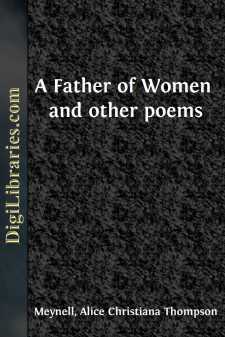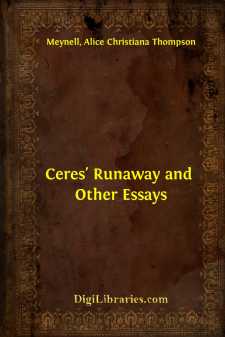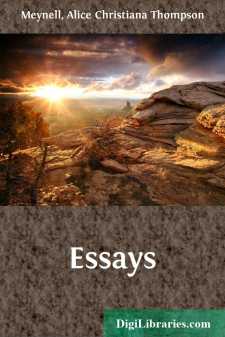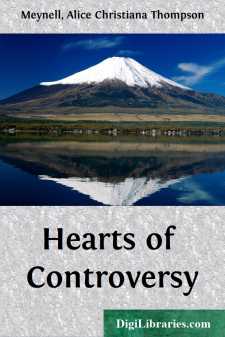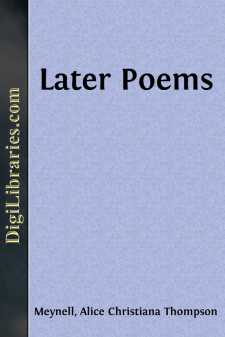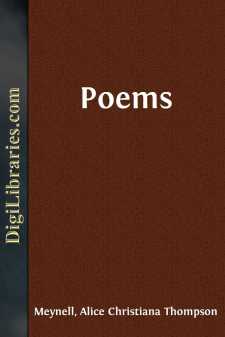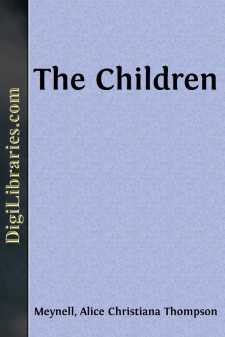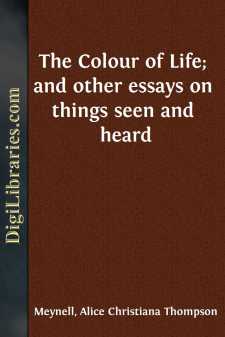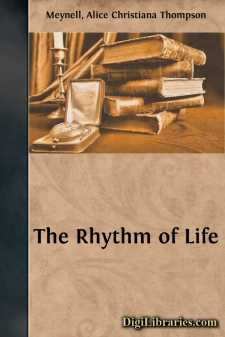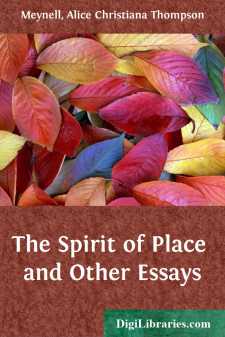Categories
- Antiques & Collectibles 13
- Architecture 36
- Art 48
- Bibles 22
- Biography & Autobiography 813
- Body, Mind & Spirit 141
- Business & Economics 28
- Children's Books 12
- Children's Fiction 9
- Computers 4
- Cooking 94
- Crafts & Hobbies 4
- Drama 346
- Education 46
- Family & Relationships 57
- Fiction 11826
- Games 19
- Gardening 17
- Health & Fitness 34
- History 1377
- House & Home 1
- Humor 147
- Juvenile Fiction 1873
- Juvenile Nonfiction 202
- Language Arts & Disciplines 88
- Law 16
- Literary Collections 686
- Literary Criticism 179
- Mathematics 13
- Medical 41
- Music 40
- Nature 179
- Non-Classifiable 1768
- Performing Arts 7
- Periodicals 1453
- Philosophy 64
- Photography 2
- Poetry 896
- Political Science 203
- Psychology 42
- Reference 154
- Religion 513
- Science 126
- Self-Help 83
- Social Science 81
- Sports & Recreation 34
- Study Aids 3
- Technology & Engineering 59
- Transportation 23
- Travel 463
- True Crime 29
Alice Christiana Thompson Meynell
Alice Christiana Thompson Meynell (1847-1922) was an English poet, essayist, and editor known for her lyrical poetry and finely crafted prose. She was an influential figure in the literary world, contributing to various journals and promoting the works of others, including her husband, Wilfrid Meynell. Meynell's work often explored themes of beauty, faith, and the inner life, earning her acclaim during the Victorian and Edwardian eras.
Author's Books:
Sort by:
A FATHER OF WOMEN Ad Sororem E. B. “Thy father was transfused into thy blood.” Dryden: Ode to Mrs. Anne Killigrew. Our father works in us,The daughters of his manhood. Not undoneIs he, not wasted, though transmuted thus, And though he left no son. Therefore on him I cryTo arm me: “For my delicate mind a casque,A breastplate for my heart, courage to...
more...
CERES’ RUNAWAY One can hardly be dull possessing the pleasant imaginary picture of a Municipality hot in chase of a wild crop—at least while the charming quarry escapes, as it does in Rome. The Municipality does not exist that would be nimble enough to overtake the Roman growth of green in the high places of the city. It is true that there have been the famous captures—those in the Colosseum,...
more...
CERES’ RUNAWAY One can hardly be dull possessing the pleasant imaginary picture of a Municipality hot in chase of a wild crop—at least while the charming quarry escapes, as it does in Rome. The Municipality does not exist that would be nimble enough to overtake the Roman growth of green in the high places of the city. It is true that there have been the famous captures—those in the Colosseum,...
more...
SOME THOUGHTS OF A READER OF TENNYSON Fifty years after Tennyson’s birth he was saluted a great poet by that unanimous acclamation which includes mere clamour. Fifty further years, and his centenary was marked by a new detraction. It is sometimes difficult to distinguish the obscure but not unmajestic law of change from the sorry custom of reaction. Change hastes not and rests not, reaction...
more...
THE SHEPHERDESS She walks—the lady of my delight— A shepherdess of sheep.Her flocks are thoughts. She keeps them white; She guards them from the steep.She feeds them on the fragrant height, And folds them in for sleep. She roams maternal hills and bright, Dark valleys safe and deep.Into that tender breast at night The chastest stars may peep.She walks—the lady of my...
more...
SONNET—MY HEART SHALL BE THY GARDEN My heart shall be thy garden. Come, my own, Into thy garden; thine be happy hours Among my fairest thoughts, my tallest flowers,From root to crowning petal, thine alone. Thine is the place from where the seeds are sown Up to the sky enclosed, with all its showers. But ah, the birds, the birds! Who shall build bowersTo keep these thine? O...
more...
FELLOW TRAVELLERS WITH A BIRD, I. To attend to a living child is to be baffled in your humour, disappointed of your pathos, and set freshly free from all the pre-occupations. You cannot anticipate him. Blackbirds, overheard year by year, do not compose the same phrases; never two leitmotifs alike. Not the tone, but the note alters. So with the uncovenated ways of a child you keep no tryst. ...
more...
THE COLOUR OF LIFE Red has been praised for its nobility as the colour of life. But the true colour of life is not red. Red is the colour of violence, or of life broken open, edited, and published. Or if red is indeed the colour of life, it is so only on condition that it is not seen. Once fully visible, red is the colour of life violated, and in the act of betrayal and of waste. Red is the...
more...
THE RHYTHM OF LIFE If life is not always poetical, it is at least metrical. Periodicity rules over the mental experience of man, according to the path of the orbit of his thoughts. Distances are not gauged, ellipses not measured, velocities not ascertained, times not known. Nevertheless, the recurrence is sure. What the mind suffered last week, or last year, it does not suffer now; but it will...
more...
THE SPIRIT OF PLACE With mimicry, with praises, with echoes, or with answers, the poets have all but outsung the bells. The inarticulate bell has found too much interpretation, too many rhymes professing to close with her inaccessible utterance, and to agree with her remote tongue. The bell, like the bird, is a musician pestered with literature. To the bell, moreover, men do actual violence. You...
more...


